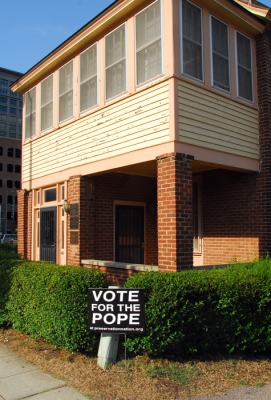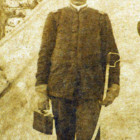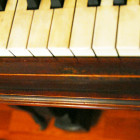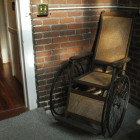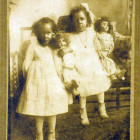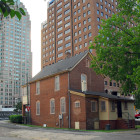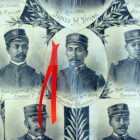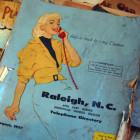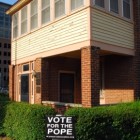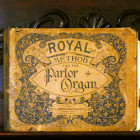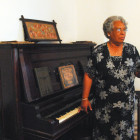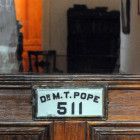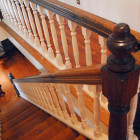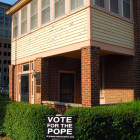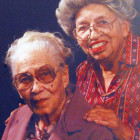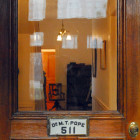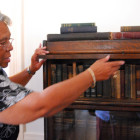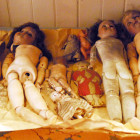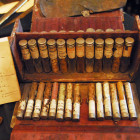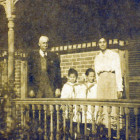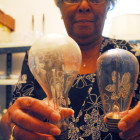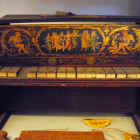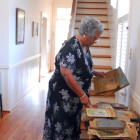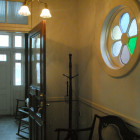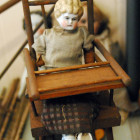The modest brick home stands resolutely on the 500 block of South Wilmington Street, hidden in the shadows of modern skyscrapers and parking decks.
At the start of the 19th century, the Pope House was just one among many others in a bustling residential neighborhood. Today, it is the only left on the block, an historic icon in a modern city.
Although the home’s appearance seems unremarkable, its formers occupants were anything but. It was once home to Dr. Manassa Thomas Pope, a prominent African-American physician, political figure and businessman, his wife Delia Haywood Phillips, and two daughters, Evelyn Bennett and Ruth Permelia.

The rear of the Pope House, dwarfed by the tall bank buildings around Wilmington Street.
According to the Pope House Museum Foundation, Dr. Pope was the only known African-American man to run for mayor of a Southern state capital during Jim Crow segregation. He was one of seven African-American men in Raleigh eligible to vote in 1902.
He was also one of the first licensed African-American physicians in the state, according to the North Carolina Medical Board.
His home and its contents are a testament to his many accomplishments. His medical license and degree from Shaw’s Leonard Medical School hang neatly on the wall, while a doctor’s bag full of various medicines sits on display.
Despite his distinctions, Dr. Pope and his home have become forgotten icons in Raleigh’s history. The Pope House Museum Foundation has been working to keep both alive.
The foundation plans to restore the home back to its 1911 condition, which is the year Pope ran for Raleigh mayor, and set up an endowment for future upkeep of the home. They also plan a parking area and Visitor’s Center to accommodate visitors, which family friend and Foundation Vice President Edna Rich-Ballentine said was “badly needed due to the size of the house.”
The estimated cost of the project is set at $3.5 million, a goal Rich-Ballentine said they “haven’t really gotten close to at all.”
“The Pope House should be saved to allow Raleigh and North Carolina to acknowledge that blacks, at all times in history, had a lot to contribute and did so. The dash between the Civil War times and our Civil Rights of today is the Pope House, which will be lost to our community, state and the world,” Rich-Ballentine said.
To help raise funds, the Foundation has entered the This Place Matters Community Challenge, held by the National Trust for Historical Preservation. The house is one of 100 historic sites nationwide competing for a chance to win up to $25,000 in grant funding.
You can help by voting, which will be open through June 30.
Photos provided by Pope House Foundation and taken by Karen Tam. Click to view full size.
- Dr. M.T. Pope, photographed during his time in the 3rd N.C. Volunteers Regiment, with his 1898 medicine bag, which remains in the Pope House.
- Piano with bite marks, (just below keys) where one of the Pope sisters bit the piano as a child.
- Small Christmas decoration/doll that is part of the memorabilia from the Pope House.
- The rear of the Pope House, dwarfed by the tall bank buildings around Wilmington Street.
- Part of Dr. Pope’s collection of books.
- Photo of Dr. M.T. Pope in a poster of 3rd Regiment of Volunteer N.C.soldiers (all black) who were mustered up for the Spanish American War.
- 1957 Raleigh Telephone book
- Piano and music in living room of Pope House.
- Edna Rich-Ballentine, “a neighborhood child,” tells stories of the Popes as she stands in the Pope sitting room.
- Window in Pope House.
- Looking downstairs from second floor. The railing going up the stairs is one piece of wood.
- Ruth Pope, left and Evelyn Pope, right, ca. end of 20th century.
- Front door with original 1901 door plate.
- Edna Rich-Ballentine opens Dr. Pope’s book case.
- Doll dishes from the sisters.
- Dolls from the sisters’ collection.
- Dr. Pope’s medical bag, the same one he holds in the 3rd NC Regiment of Volunteers’ photo.
- Toy piano that still works.
- Edna Rich-Ballentine looks through collection of books on table in main hallway of Pope House.
- Main entranceway of the Pope House.
- Toy doll and high chair.
